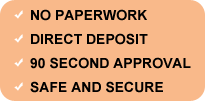
If you have an unexpected financial emergency which you need to take care of in a hurry, a fast cash loan may be the perfect solution.
Should you use caution when taking out a fast cash loan? Of course you should. Any time you borrow money it is a serious responsibility. Whether you choose a traditional loan from a bank, apply for a credit card, or decide on a fast cash advance, someone is lending you money. And you are expected to pay it back on time and in full.
There are many different names for basically the same type of loan: payroll advance, fast cash, and check cashing are just a few. A fast cash loan is a small personal loan ranging in amount from $100 to $1000 depending on your income. Fast cash lenders generally do not run a credit check on potential customers so if your credit is less than perfect, it's ok.
These types of loans are considered short-term loans. The terms are quite different from a typical personal loan offered by a bank or credit union. Normally, you have only two weeks to fully repay the money you owe. This includes the loan amount plus any fees and interest charges. A typical interest charge would be $15 for every $100 you borrow but this can vary according to your specific lender.
Unlike a car title loan, a fast cash loan is unsecured. This means you don't have to provide any collateral. The application process is quick and easy. Here's what you'll need to provide:
If you apply for a fast cash loan through one of the many secure websites available, the approval process normally takes just a couple of minutes. In most cases, the cash funds you are approved for can be in your checking account within one business day.
Fast cash loans are meant to be used for true financial emergencies. You should never consider taking out this type of loan just to buy something you want but don't have the cash to cover. They should also never be thought of as a solution to long-term debt problems. Continuous use of payday type loans can lead to a cycle of debt which is very hard to break.
Fast cash loans are expensive. Lenders understand that most people applying for a loan are in a tough financial bind as far as needing money quickly. Consequently, they can charge you mightily for the convenience of receiving your loan proceeds in a short amount of time. You should always be prepared to repay your loan in full when it is due. If you aren't sure you will have the needed funds when it's time to pay up, consider finding another source from which to borrow. Many lenders do not offer loan extensions and some states strictly forbid them.
Many states have banned fast cash loans altogether while others have limited the amount of interest a payday lender can charge. You should check with your local Better Business Bureau and your specific state's Office of Consumer Affairs to learn more about the rules and regulations governing where you live.

